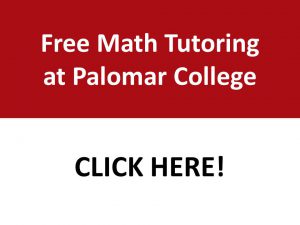6 units/6 hours lecture/Prerequisite: Eligibility determined through the math placement process.
The core algebra skills needed to understand the concepts, formulas, and graphs used in transfer-level statistics are investigated. Integrates numeracy, proportional reasoning, algebraic reasoning, and functions. Develops conceptual and procedural tools that support the use of key mathematical concepts in a variety of contexts. Throughout the course, college success content will be integrated with mathematical topics. This course is NOT intended for math, science, computer science, business, or engineering majors.
**Math 54 does not count as the math requirement for the AA degree.
6 units/6 hours lecture/Prerequisite: A minimum grade of ‘C’ in either MATH 50, MATH 50B, or MATH 53 or eligibility determined through the math placement process.
A review of elementary algebra and in-depth coverage of intermediate algebra intended for the student who has previous experience with algebra. Meets requirement for the A.A. degree. Meets prerequisite requirement for mathematics course numbers 100-120.
Math 6 provides just-in-time support for Math 56.
4 units/4 hours lecture/Prerequisite: Eligibility determined through the math placement process.
Graphic, numeric, analytic and applied perspectives on topics including linear, quadratic, exponential and logarithmic functions, exponents and radicals, linear and nonlinear systems of equations and inequalities.
3 units/3 hours lecture/Prerequisite: A minimum grade of ‘C’ in Math 56 or Math 60 or eligibility determined through the math placement process or Corequisite: Math 1/Transfer acceptability: CSU; UC
Selected topics from logic, modern algebra, number theory, and geometry. Designed to give the student an introduction to the structure of mathematics and its applications. Recommended for liberal arts students.
Math 1 provides just-in-time support for Math 100.
3 units/3 hours lecture/Prerequisite: A minimum grade of ‘C’ in Math 56 or Math 60 or eligibility determined through the math placement process or Corequisite: Math 14/Transfer acceptability: CSU; UC
This course is designed to give students mathematical tools for understanding the modern world. The course includes linear and exponential functions to model growth and decay processes and the effect of compounding interest in personal finance situations. Elementary probability theory to calculate the likelihood of events and descriptive statistics will be used to organize and make sense of data sets.
Math 14 provides just-in-time support for Math 101.
3 units/3 hours lecture/Prerequisite: A minimum grade of ‘C’ in Math 56 or Math 60 or eligibility determined through the math placement process /Transfer acceptability: CSU; UC
Selected topics from the real number system including properties and operations with integers and rational numbers as fractions and decimals. Additional topics include problem solving, numeration systems, number theory, and topics in logic and set theory. Recommended for prospective teachers.
4 units/4 hours lecture/Prerequisite: A minimum grade of ‘C’ in Math 56 or Math 60 or eligibility determined through the math placement process/Transfer acceptability: CSU; UC
Study of the behavior and characteristics of functions from graphic, numeric, analytic, and applied perspectives, including general polynomial functions, rational functions, exponential and logarithmic functions, and sequences. Systems of equations in several variables with an emphasis in matrix solutions.
Math 10 provides just-in-time support for Math 110.
3 units/3 hours lecture/Prerequisite: A minimum grade of ‘C’ in Math 56 or Math 60 or eligibility determined through the math placement process/Transfer acceptability: CSU
The trigonometric functions and their applications including emphasis on the analytical aspects, identities, and trigonometric equations.
4 units/4 hours lecture/A minimum grade of ‘C’ in Math 56 or Math 60 or eligibility determined through the math placement process or Corequisite: Math 20/Transfer acceptability: CSU; UC
The use of probability techniques, hypothesis testing, and predictive techniques to facilitate decision-making. Topics include descriptive statistics, probability and sampling distributions, statistical inference, correlation and linear regression, analysis of variance, chi-square, and t-tests, and application of technology for statistical analysis, including interpretation of the relevance of the statistical findings. Applications using data from disciplines including business, social sciences, psychology, life science, health science, and education.
Math 20 provides just-in-time support for Math 120.
4 units/3 hours lecture, 3 hours laboratory/Prerequisite: A minimum grade of ‘C’ in Math 56 or Math 60 or eligibility determined through the math placement process/Transfer acceptability: CSU; UC
The first course of a two-semester sequence designed to prepare STEM students for calculus. The course covers advanced algebra topics, including functions and their properties. Focus is on linear, quadratic, polynomial, rational, exponential and logarithmic functions, and systems of equations and inequalities, including rate of change and explicit covariational reasoning to investigate and explore relationships between quantities and how these relationships change. Students solve contextualized problems individually and in teams to gain a deeper understanding of functions and their applications.
4 units/3 hours lecture, 3 hours laboratory/Prerequisite: A minimum grade of ‘C’ in Math 126 or Math 110 or eligibility determined through the math placement process/Transfer acceptability: CSU; UC
The second course in a two-semester sequence designed to prepare STEM students for calculus. This course covers basic concepts of analytic geometry and trigonometry, including definitions and properties of trigonometric functions. Students use multiple representations of functions, rate of change and explicit covariational reasoning to investigate and explore relationships between quantities and how these relationships change. Topics include solutions of applied problems using right triangles, graphs of trigonometric functions, trigonometric identities, trigonometric equations, inverse trigonometric functions, polar coordinates, conics, systems of nonlinear equations and sequences and series. Students model and solve contextualized problems individually and in teams to gain a deeper understanding of analytic geometry, trigonometric functions, and applications.
4 units/4 hours lecture/Prerequisite: A minimum grade of ‘C’ in Math 110 or Math 126 or eligibility determined through the math placement process/Transfer acceptability: CSU; UC
Functions and their graphs including exponential and logarithmic functions, single variable calculus, limits, differentiation, integration and their applications, multivariable calculus, with application to business, social sciences, and behavioral science.
Math 13 provides just-in-time support for Math 130.
5 units/5 hours lecture/Prerequisite: A minimum grade of ‘C’ in Math 115 or eligibility determined through the math placement process/Transfer acceptability: CSU; UC
Designed for students who intend to take calculus. Emphasizes study of the behavior and characteristics of functions from graphic, numerical, analytic, and applied perspectives. Includes trigonometric functions, general polynomial functions, rational functions, exponential functions, logarithmic functions, absolute value functions, functions with rational exponents, and sequences. Selected topics from analytic geometry and linear systems are also presented.
5 units/5 hours lecture/Prerequisite: A minimum grade of ‘C’ in Math 110 and Math 115 or Math 127 or Math 135 or eligibility determined through the math placement process/Transfer acceptability: CSU; UC
An introduction to analytic geometry, differentiation and integration of algebraic and transcendental functions of a single variable, and applications of differentiation.
4 hours lecture/Prerequisite: A minimum grade of ‘C’ in MATH 56 or 60 or eligibility determined through the math placement process/Transfer acceptability: CSU; UC
Note: Cross listed as SOC 205
Quantitative and qualitative methods as applied to behavioral science data. Frequency distributions, measures of central tendency, variability, hypothesis testing, measures of probability and significance, correlation, regression, and inferential statistics. Also included are data entry, graphing, statistical analysis, and interpretation of data using word processing, spreadsheet, and statistical software.
4 hours lecture/Prerequisite: A minimum grade of ‘C’ in MATH 56 or 60 or eligibility determined through the math placement process/Recommended preparation: BUS 175 or equivalent.
The applied science of basing business decisions on numerical data that can be used to reduce risk in customer, product, investment, and other significant operational and strategic business decisions. Descriptive statistics (tabular, numerical, and graphical) and inferential statistics (random sampling, sampling distributions, probability distributions, hypothesis testing, linear regression, t-tests) are used within the context of business decisions. Makes extensive use of technology, including spreadsheets and other software tools, for analyzing data. Designed for students majoring in business or economics.



